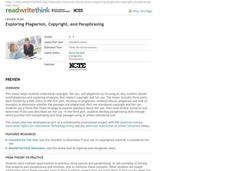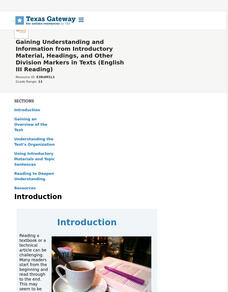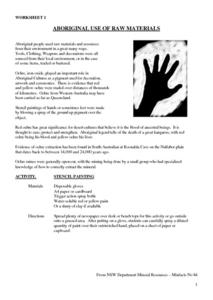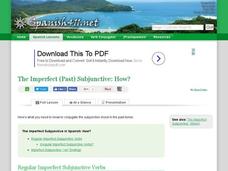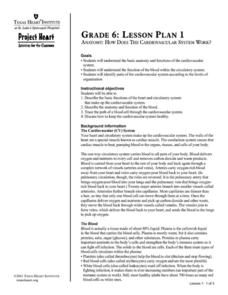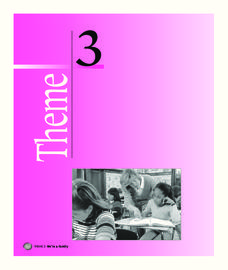Curated OER
Introduce Vocabulary: How to Make an Apple Pie and See the World (Priceman)
Ask budding readers, "How do you make an apple pie?" You may get many answers, but Marjorie Priceman takes the cake with her idea in How to Make an Apply Pie and See the World, an adventurous tale full of wonder and new vocabulary. Using...
Library Sparks
Reference Tools Vocabulary Challenge
Students love the opportunity of going to the library to jump into that one comfy chair in the whole room with a book, or be a lucky one to get to the computers before anyone else. But knowing how to locate books and other reference...
EngageNY
Reading and Writing About How to Perform a Process: How Meg Lowman Studies the Rainforest (Pages 4–8)
It's a process. Scholars read to understand the process Meg Lowman uses for pressing specimens. Learners work in groups to define vocabulary and create a list of the steps used. They then carry out the steps using provided materials.
EVSC Cats
How to Create Documents in a Shared Google Drive Folder
Help your class join you in Google Drive with this how-to page that focuses on creating shared folders. A combination of images and words guide learners through the various steps to take to create a document in a shared folder. More...
Curated OER
Introduce Vocabulary: Franklin Goes to the Hospital (Bourgeois)
Franklin the turtle is on another adventure in Paulette Bourgeois' book Franklin Goes to the Hospital, and there are plenty of new words for your young readers to explore as they hear this story. Although you can include more, you'll...
Crafting Freedom
Harriet Jabocs and Elizabeth Keckly: The Material and Emotional Realities of Childhood in Slavery
Learning how to make accurate inferences by putting together facts found in multiple sources is one of those skills all learners must develop, but one that can be a challenge to teach. This resource is a must-have for your curriculum...
Florida Center for Reading Research
Vocabulary: Word Meaning, Word Wrap
Support young learners' acquisition of new vocabulary with this pair of graphic organizers. Using context clues and reference materials, children complete each section of the activity, including the definition, synonyms, examples and...
Turabian Teacher Collaborative
How to Find a Research Question
There are so many fascinating topics and concepts to learn about in the world. But where do you start? Begin formulating questions for an argumentative research paper with a guided practice lesson. After coming up with three questions...
ReadWriteThink
Exploring Plagiarism, Copyright, and Paraphrasing
Plagiarism, copyright, and fair use are the focus of a three-part instructional activity designed to inform scholars of how to properly cite others' work. First, pupils use a KWL chart to begin thinking and discussing plagiarism. They...
Curated OER
Reference Materials
After a class discussion where kids share how they find answers to their questions, learners explore the world of reference materials such as, an atlas, an almanac, and an encyclopedia. The Internet is also discussed as a way to access...
Curated OER
Word Reference Materials
A class discussion on reference materials opens up a lesson on how to use these important resources. They discover that dictionaries, glossaries, and thesauruses are called word reference resources, and they practice using them. The...
Overcoming Obstacles
Using Appropriate Resources
A lesson dives deep into reference materials. The class begins with a discussion of which resources are best used for specific purposes and how to identify ways to get the needed information. Learners share information about the internet...
Curated OER
Farewell to Manzanar
Examine human resilience across two texts with a detailed unit. Over the course of a week, learners will conduct a close reading of excerpts from Unbroken and Farewell to Manzanar. The resource includes clear procedures for reading and...
Texas Education Agency (TEA)
Gaining Understanding and Information from Introductory Material, Headings, and Other Division Markers in Texts (English III Reading)
All teachers are teachers of reading! The 13-part interactive series ends with a lesson that teaches learners (and their instructors) how to approach reading their textbooks. After learning about several strategies, users test their...
Project Maths
Introduction to Trigonometry
The topic of trigonometric ratios is often covered with loads of rote memorization baked into the activity. This activity set, however, leans more on using similar triangles and discovery learning to help young geometers develop a deeper...
Curated OER
Learning Vocabulary by Using Reference Materials
Finding engaging ways to help your middle schoolers build their vocabulary is not easy to do. The lesson presented here offers a great way to motivate them to build vocabulary by making it into a game. Teams of pupils use a dictionary...
National Endowment for the Humanities
Revolution '67, Lesson 2: What Happened in July 1967? How Do We Know?
Even in a world in which dozens of participants and curious onlookers record every controversial event, the basic facts of what happened are often in dispute. Revolution '67, Lesson 2 explores 1967 Newark, New Jersey using an examination...
National Endowment for the Humanities
Revolution '67, Lesson 1: Protest: Why and How
To some people, protesting is as American as apple pie, but the factors that lead to protests can be as confusing to veteran activists as to today's youth. Revolution '67 explores the riots in Newark, New Jersey as a case study. Using...
University of the Desert
How Do I Feel That My Culture Is Misunderstood by Others?
Using video clips of young adults from around the world describing their cultures and how they can be misunderstood, learners compare their own cultural point of view to that of others through discussion and writing.
EngageNY
Using Sample Data to Compare the Means of Two or More Populations
Determine whether there is a difference between two grades. Teams generate random samples of two grade levels of individuals. Groups use the mean absolute deviation to determine whether there is a meaningful difference between the...
NSW Department Mineral Resources
Aboriginal Use of Raw Materials
What's the difference between base metals and precious metals? Experimenting with natural metals is an interesting way for kids to learn about the world around them. Use a resource that contains over 30 pages of worksheets and...
Curated OER
The Imperfect (Past) Subjunctive: How?
Teach your class how to form the imperfect subjunctive. Included here is information on and examples of regular imperfect subjunctive verbs, irregular imperfect subjunctive verbs, and imperfect subjunctive -se endings displayed in long...
Texas Heart Institute
Anatomy: How Does the Cardiovascular System Work?
How can the circulatory system compare to a city map? Pupils distinguish the "roadways" and "vehicles" of the cardiovascular system, compare the anatomy and function of veins and arteries, and review different types of blood cells with...
Houghton Mifflin Harcourt
We’re a Family: English Language Development Lessons (Theme 3)
Teach your English language learners how to talk about their families with three weeks of lessons. Over the course of the thematic unit, learners pick up new vocabulary so that they can talk about families and relationships, clothing,...










